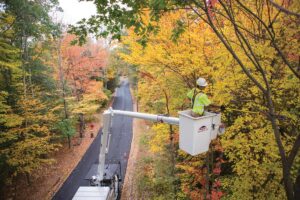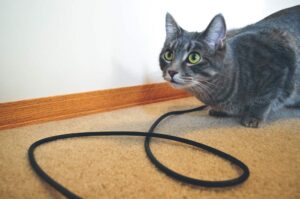 As the snow and ice melt away, many homeowners take to the outdoors to tackle projects including cleaning out gutters, trimming trees, mending fence and digging in the yard. Regardless of your to-do list of outdoor projects, electrical safety needs to be a high priority.
As the snow and ice melt away, many homeowners take to the outdoors to tackle projects including cleaning out gutters, trimming trees, mending fence and digging in the yard. Regardless of your to-do list of outdoor projects, electrical safety needs to be a high priority.
Safe Electricity urges homeowners to take a few minutes before a project to prepare for the job. Always examine electrical equipment before use by noting the wear and tear of the tool and cord, and take note of potential work area hazards by looking up and around.
Always be aware of power lines, especially when working with long metal tools like ladders, pool skimmers, and pruning poles or when working on a roof.
Keep yourself and equipment at least 10 feet away from power lines. Always call a professional for work near lines, like tree trimming for example.
When using extension cords, only use ones made for outdoor use. Use heavy-duty, three-pronged cords for tools. Never remove or bend back the third prong on a plug.
If it is raining or the ground is wet, never use electric tools. If using an electrical tool while wet or standing in water, you could be injured or receive a fatal shock.
Further, make sure all outdoor outlets are equipped with ground fault circuit interrupters (GFCIs). A GFCI monitors the flow of electricity in a circuit. If there is any irregularity, the GFCI will shut off the electric current. If the outdoor outlets do not have a GFCI, install one or purchase a portable GFCI. And always make sure to keep your work area tidy and free from any tangled or frayed cords.
Call 811 before you dig
If the spring outdoor project involves digging, like planting a tree for example, always call JULIE before you dig at 811 or 800-892-0123 to have public utility lines marked in your yard. This service is free and prevents damage and injury. Never assume you know the location or depth of underground utility lines.
Safe digging starts when you contact JULIE. According to state law, the person actually doing the digging is required to call JULIE with the locate request information at least 48 hours (two working days, excludes weekends and holidays) in advance of the start of excavation. If you want to start your project over the weekend, remember to contact JULIE, Inc. by Wednesday at 4:00 p.m.
At the end of your call, the operator will provide you with a dig number for your records. Please be prepared to write down this number as proof of your call to JULIE.
In order to help the utility locator properly identify your project area, JULIE recommends that you mark the area where you will be digging with white paint and/or flags.
Information to the JULIE operator:
• Your name, address, a phone number at which you can be reached and a fax and/or pager number, if available;
• County and city or county and unincorporated area of township;
• Location at which the excavation will take place, which may include but not be limited to, address, cross street (within 1⁄4 mile), subdivision name, etc.;
• The start date and time of the planned excavation;
• The type and extent (size of excavation area) of the work involved, including if white paint, flags and/or stakes were used to outline the proposed excavation area; and
• Section and quarter numbers if available.
What happens after the call?

Within two working days of your call to JULIE, a representative from each member utility company will mark the location of their underground facilities with paint and/or flags at the excavation site. Make sure that your property is accessible.
The utilities are only required to mark the facilities that they own, not privately installed or owned lines or facilities. Privately owned facilities may include water and sewer services, as well as electric and gas lines to a garage or workshop.
For more information about outdoor electrical safety, visit SafeElectricity.org







